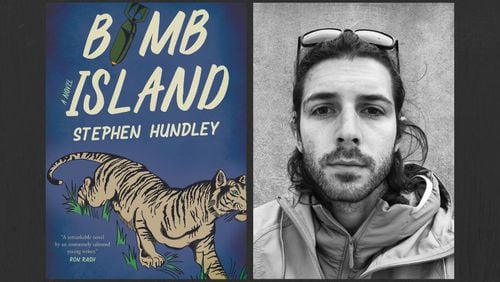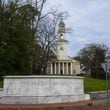Savannah author Stephen Hundley has inflated a wild and visceral world into existence on a barrier island off the coast of Georgia in his debut novel “Bomb Island.” Among the native flora and fauna dwell a dwindling commune of eclectic humans and a herd of feral horses hunted by a full-grown tiger — while a rogue atomic missile sits just off shore. Fourteen-year-old Fish carries the poignant story as he comes of age, struggling to define his manhood and discover where he fits in society.
Before he can focus on self-actualization, Fish must stay alive. That’s no easy feat with a white tiger named Sugar roaming the island. Hundley opens with a riveting beach scene not for the faint of heart as the horses defend themselves against the tiger. Fish intervenes, but the encounter turns violent and hammers home the danger all of Bomb Island’s residents are exposed to with Sugar prowling free.
Sugar was brought to the island by the commune’s founder, Whistle, a captivating woman longing to experience true freedom. Whistle is a priestess-sage who took in Fish before moving to Bomb Island a decade ago. She has a purple-colored bullet scar on her face that stretches from eyebrow to ear, is guided by her dreams and is perceived as immortal after surviving the gunshot. Whistle is only one of Hundley’s vivid characters who prove as unique as the setting itself.
A Bomb Island exists in the real world, a swath of land sitting in the middle of Lake Murray in South Carolina known for purple-martin bird watching. During the Second World War, the U.S. military used the island as a target for bomb-dropping drills. Hundley has taken these nuggets of truth and spun a fantastical biosphere into existence.
The fictional Bomb Island is a present-day bird sanctuary, but in the 1950s, a fighter jet and a heavy bomber were conducting simulation drills and collided there. Their crash dropped an atomic missile into the ocean off the island’s coast. With farcical confusion, the Air Force and Navy disagree if the plutonium core was installed. Regardless, the missile was tested, ruled inactive and left embedded in the sea floor. Across the ocean’s sound is the mainland civilization of Royals, a two-gas-pump town that generates tourism around the missile by branding itself “The Nuclear Capital of the South.”
At the novel’s opening, only four of the commune’s original 15 inhabitants remain on Bomb Island: Fish and Whistle, whom he views as his mother, and two men he considers his fathers, Nutzo and Reef. Nutzo, the older man, is Fish’s closest confidante and has gone missing. Reef and Fish fear Sugar is the culprit.
Yet Whistle’s dreams assure her Nutzo is alive. She’s willing to move to safety while they find a different home for Sugar but won’t leave the island without Nutzo. Will Whistle find her long-lost friend before Sugar turns on all of them? This mercurial unknown provides a significant amount of the tension driving the action.
Interpersonal conflicts between Fish and the residents of Royals also make life challenging for Fish. One afternoon, Fish is presented with his first of many opportunities to decide what sort of man he wants to be. They’re aboard the Atomic Pleasure Cruise, Whistle’s glass-bottom-boat snorkeling tour, when they encounter an aggressive Royals resident.
Derbier is a charter fisherman who insults Whistle before throwing his lit cigar onto her boat. This infuriates Fish, who struggles to heed Whistle’s warning to turn the other cheek. “You don’t have to be a killer to be an adult, to be a man,” Whistle tells Fish, all while her dreams foretell of his anger winning in the end. Fish would rather draw from Nutzo’s example, who earned his name in a dramatic showdown Fish could only dream of being man enough to execute.
It’s easy to draw parallels between “Bomb Island” and “Lord of the Flies,” William Golding’s 1954 classic about wayward boys stranded on an island. But it isn’t only the remote setting or conch shell, a totem of power in Golding’s story that Hundley uses symbolically in his.
As in the classic tome, there’s a cruelty driving characters like Derbier that become Fish’s primary obstacle to overcome, lest he join their ranks. Things worsen for Fish after a bully with a camera does horrible things that leave him filled with rage.
These incidents cause “hurt and anger like twin omen birds on his shoulders, digging their claws into his back.” And dead birds do symbolize a bad omen for Fish, who braces for potential danger every time he encounters a lifeless seagull.
While coping with maliciousness, Fish also experiences normal adolescent struggles. He’s insecure about his lip mole and boyish round belly, especially after he meets Celia, a tattooed 15-year-old with strong opinions he finds intriguing. One major complication — Celia is Derbier’s daughter. She also has her own ideas about what qualities make up a man.
The complexities inherent in Celia and Fish’s relationship drive the rest of the novel’s narrative tension and provide him with multiple opportunities to choose what shape his manhood will take. Will he fall in line with Whistle’s commitment to pacifism or rise in ranks to outmaneuver his aggressors? Ultimately, Fish must decide.
Stephen Hundley has created an evocative and eccentric world that delivers much more than an offbeat adventure about a tribe of misfits. Gritty, primeval and hauntingly human, “Bomb Island” is sometimes funny and other times sad. It’s an action-packed thrill ride infused with depth and tenderness — if Fish can stay alive long enough to become a man.
FICTION
“Bomb Island”
by Stephen Hundley
Hub City Press, 224 pages, $25.95
AUTHOR EVENT
Stephen Hundley. In Conversation with Mickey Dubrow. 7 p.m., May 21. Free with registration. Georgia Center for the Book. Decatur Library, 215 Sycamore St., Decatur. 404-370-3070, georgiacenterforthebook.org
About the Author






